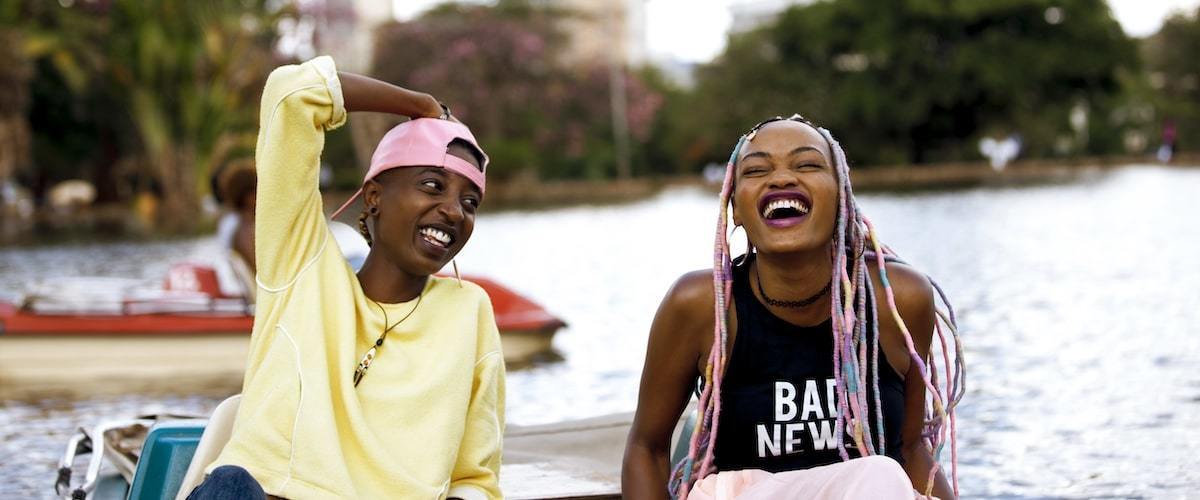Rafiki is the African love story that is all of us.
On May 16th, 2019, FESPACO screened Rafiki at Alliance Francaise for its FESPACO @ 50 Film Night. Adapted for film by Kenyan filmmaker, Wanuri Kahui, Rafiki sparked controversy and reignited the timeless debate about LGBTQI+ rights in Africa when it won a nomination at the Cannes Film Festival last year but was banned in its home country. Rafiki is a story of young lesbian love, based on the award-winning short story, Jambula Tree by Monica Arac de Nyeko. The plot revolves around two young women from different socio-economic backgrounds who fall in love in a society that socially and legally forbids their love.

The film score and cinematography is consistent with Kanuri Wahui’s Afrobubblegum movement of creating art that is a ” fun, fierce and frivolous representation of Africa”. This theme is reflected in the film through splashes of light and lively colour interspersed throughout the film; the colourful clothes, hair and nails of both Ziki and Mama Atim’s daughter, Blacksta’s multi-coloured bike, Kena’s graffiti art-designed skateboard among other shots of city-life in Nairobi. The film contains a lot of close-up shots particularly in scenes that are heavy and emotional, like the intimate moments Kena and Ziki share, and the physical violence that they are subjected to after they are found out. The closeup shots and the film soundtrack – consisting of an all African female composition was instrumental in effectively setting the tone of the film and evoking intense emotions among the audience.

Kena Mwaura the protagonist, works in her father’s store in Nairobi where she first meets Ziki Okemi, her love interest. Kena and Ziki are the children of rival politicians and their continued association provokes a lot of gossip and speculation. This contextual framing is important given that in many African countries the ban on same-sex marriage is political and politicians feed on the people’s homophobia to influence sentiments. A “taboo” relationship then, between two politicians daughters forces people to have to ask and find answers to difficult questions around love and sexuality.
“Good Kenyan girls make good Kenyan wives” we’re told in the film, but Kena and Ziki want something more than that so they make a pact to never be like any of the others in the town. This pact is a symbolic defiance of the patriarchy and heteronormative constructs. Kena and Ziki are dreamers, and at the same time very real. Kena aspires to become a doctor. Ziki wants to travel the world and see new places. They’re also in love with each other, and their love is not tolerated by society, putting them at risk of very real violence.

Although a compelling story in its entirety, the film’s exposition was not sufficiently developed to give more robust insight into the backgrounds of the main characters and how it impacts on their motivations and behaviour in the film. However, we did see some development in John Mwaura’s (Kena’s father) character, which is a significant commentary on unconditional love and acceptance for LGBTQI+ kids.

Wanuri Kahiu, film director and actresses Samantha Mugatsia and Sheila Munyiva during a photocall for ‘Rafiki’ at the Cannes Film Festival in France.
The ban on Rafiki was lifted for a week to meet the requirements for Oscars eligibility. That week it broke box office records, becoming the second highest-grossing Kenyan film of all time.
In a moving and impressive performance by Samantha Mugatsia and Sheila Munyiva, Rafiki gives African women a chance to see love through the eyes of women who look like us, talk like us and dream like us. It ends on a hopeful note, reminding us that love will endure in spite of hate and violence.
Have you seen Rafiki yet? What are your thoughts on it?








2 comments On Thoughts on Rafiki
I saw Rafiki at the same time that you did. So much gratitude to AF and Fespaco for screening this as I’ve been so eager to watch it. Overall I enjoyed the film. I feel like it’s the first time that I’ve seen a queer African love story and for that reason alone it’s important. Thanks so much for this review
I saw Rafiki a few weeks ago and wished that the actual elements of the film (back stories and character development, dialogue, even the plot) matched its context. Pointing out Wanuri’s “Afrobubblegum” style (how cool) makes me appreciate the content a little more. All in all a very important and timely film that could and should have more emotional heft.